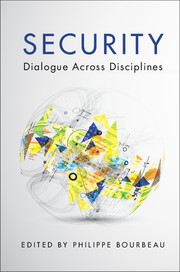Book contents
- Frontmatter
- Contents
- Notes on contributors
- Acknowledgments
- 1 A multidisciplinary dialogue on security
- 2 Philosophy: The concepts of security, fear, liberty, and the state
- 3 Anthropology/ies: Moving beyond disciplinary approaches to security
- 4 Geography: Securing places and spaces of securitization
- 5 Sociology: Security and insecurities
- 6 International relations: Celebrating eclectic dynamism in security studies
- 7 Psychology: The phenomenology of human security
- 8 International political economy: Conceptual affinities and substantive differences with security studies
- 9 Criminology: Reimagining Security
- 10 International law: Between legalism and securitization
- References
- Index
4 - Geography: Securing places and spaces of securitization
Published online by Cambridge University Press: 05 December 2015
- Frontmatter
- Contents
- Notes on contributors
- Acknowledgments
- 1 A multidisciplinary dialogue on security
- 2 Philosophy: The concepts of security, fear, liberty, and the state
- 3 Anthropology/ies: Moving beyond disciplinary approaches to security
- 4 Geography: Securing places and spaces of securitization
- 5 Sociology: Security and insecurities
- 6 International relations: Celebrating eclectic dynamism in security studies
- 7 Psychology: The phenomenology of human security
- 8 International political economy: Conceptual affinities and substantive differences with security studies
- 9 Criminology: Reimagining Security
- 10 International law: Between legalism and securitization
- References
- Index
Summary
With disciplinary roots in imperialism and the military, geography has long engaged with security issues. As the French geographer Yves Lacoste (1976) famously stated, “La géographie ça sert d'abord à faire la guerre” (Geography serves, first and foremost, to wage war). Mainstream geography grounded in materialist positivism provides spatial information to identify and address a broad range of security risks, including crime and terrorism but also natural disasters, diseases, pollutants, or chronic poverty. In contrast, critical geography drawing from anarchism, feminism, and postmodernism mostly seeks to demonstrate how insecurity is often paradoxically generated by dominant security discourses and practices, while striving to bring about progressive alternatives. Geography is thus not only a discipline deploying spatial analysis to achieve greater security, but also one concerned with the consequences of “securitization” and with emancipatory possibilities for a less vulnerable world. This chapter provides a survey of geography's engagement with concepts of security, charting some of the main questions, theoretical approaches, and methodologies of this broad discipline before discussing some of its strengths and limitations.
Geography has been and remains deeply connected with “official” security agendas (Mamadouh 2004; O'Loughlin and Heske 1991). Tasked with the mission of “knowing the world” and helping to pinpoint the location and movements of threats, geography and geographers have been mobilized in the production of military maps, atlases, and systems of geosurveillance ranging from CCTV to drones and satellites. Indeed, many professional geographers have served, and continue to serve, “national security” agendas – some in the direct employ of the military (Woodward 2005). My own alma mater department at Oxford was the first academic home of Professor Halford Mackinder (of “geographical pivot of history” fame); during the Second World War, the department also played an active role in the British war effort, assembling an odd mix of spatial information – from geological surveys to tourism leaflets – to produce British operational maps. The department, anecdotally, was also said to be a place for MI6 to recruit undergraduates. Geography, from this perspective, is partially a discipline in the service of statecraft – a necessary instrument of spatial analysis in the toolbox of security practices, as seen in the context of 9/11 and the “War on Terror” (Cutter et al. 2003; Flint 2003). Yet geography is also a discipline engaging more broadly with “security.”
- Type
- Chapter
- Information
- SecurityDialogue across Disciplines, pp. 62 - 89Publisher: Cambridge University PressPrint publication year: 2015
- 3
- Cited by

